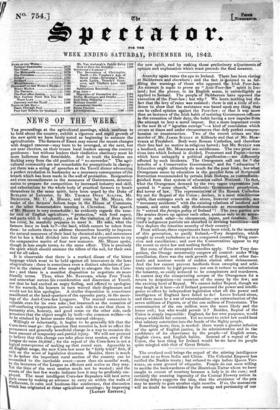Anarchy again turns the eye to Ireland. There has been
rioting at Skibbereen and elsewhere ; and the fact is .pointed to as ful- filling the warnings of 'those who opposed, the Irish _Poor-law. An attempt is made to prove an " Anti-Poor-law " spirit in Ire- land ; but the phrase, in its English sense, is unintelligible as applied to Ireland. The people of Skibbereen have opposed the execution of the Poor-law ; but why ? We learn nothing but the fact that the levy of rates was resisted : there is not a tittle of evi- dence to show that the resistance was based upon any thing that can be called opinion against the Poor-law; or that it wty more than an instance of the Irish habit of resisting Government-officers in the execution of their duty, the habit having a new impulse from the attempt to levy a novel impost. But a more important event is the new fit of " agrarian outrage "—a kind of convulsion which occurs at times and under circumstances that defy perfect compre- hension or Counteraction. Two of the recent crimes are the murder of Mr. JAMES SCULLY at Kilfeacle and that of Mr. Mos- TIMER at Freshford. Both were Roman Catholics, and therefore their fate had no motive in religious hatred; but Mr, ScuLLT was a landlord, and Mr. MORTIMER a middleman. The two great sec- tions into which Ireland is divided, Protestant and Papist—terms which have unhappily a political signification —are differently affected by such incidents. The Orangemen call out for " the benefits of a Conservative Government," and for "education".! Education might ultimately do much for the poor Irish ' • but what Orangemen mean by education is the peculiar form of Scriptural Instruction recommended by certain Irish Bishops, as contradistin- guished from that system of education called National. lIn fact, what the Orangemen demand by the two vague expressions just quoted is " more church," wholesale Government proselytism, Ind terror of law. The representatives of the Roman Catholics Cry out for Repeal of the Union ; declare, in a most mischievous spirit, that outrages such as the above, however censurable, are " necessary accidents" with the existing relations of landlord and tenant, and titter such silly rhodomontade as recommendations to " extend the foreign policy of Ireland"! The two parties are like armies drawn up against each other, anxious only to do tome- thing to each other—to circumvent, injure, and retaliate. ire- land's indigenous patriots are absorbed in devising hostilities—and they deplore the intestine anarchy of their country!
From without, three experiments have been tried, in the memory of this generation, to pacify Ireland,—Tory despotism which sought to crush turbulence as in a conquered country ; Whig coer- cion and conciliation ; and now the Conservatives appear to try the resort to strict law and nothing further.
But none of these attempted remedies apply. Under Tory des- potism, the Orange monstrosity outgrew all control: under Whig conciliation, there was the rank growth of Repeal, and other fan- tastic and noxious weeds of sudden elation after debasement. And the law cannot prevent landlords from sweeping and arbi- trary ejectments by legal process; nor can it reduce to submission
the tenantry, so easily seduced to be conspirators and murderers. It cannot stay the exasperating scream of the Orangemen for a return to despotism—to coercion of the many by the few; nor the exciting howl of Repeal. We cannot indict Repeal, though we may laugh at it here—as if Ireland possessed the power and intelli-
gence to effect by independent legislation what all the power and intelligence of England have failed to do! Leave Ireland alone, and there must be a war of extermination—an extermination of the
seven millions of Papists, or of the one million of Protestants. The extermination of the one million were the more likely and the lesser evil; but who would permit it ? Besides, Repeal of the
Union is simply impossible: England, for her own purposes, would always withhold her consent. Yet no resort to strict law could beat that salutary conviction into the heads of the flighty people.
Something more, then' is needed: there wants a greater infusion of the spirit of English justice, in its administration and in the confidence of its observance by the people—of English sense, English views, and English habits. Instead of a repeal of the Union, the best thing for Ireland would be-to have its people quite mingled with that of Great Britain.


























